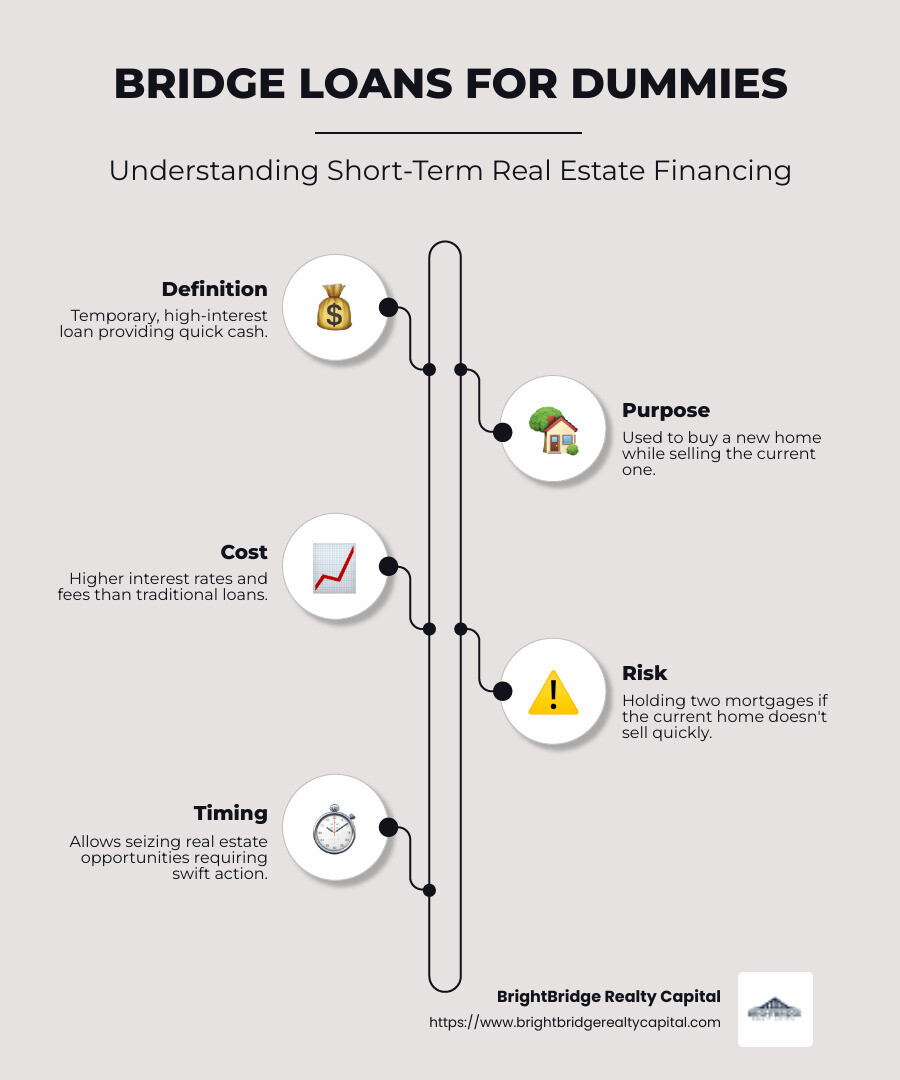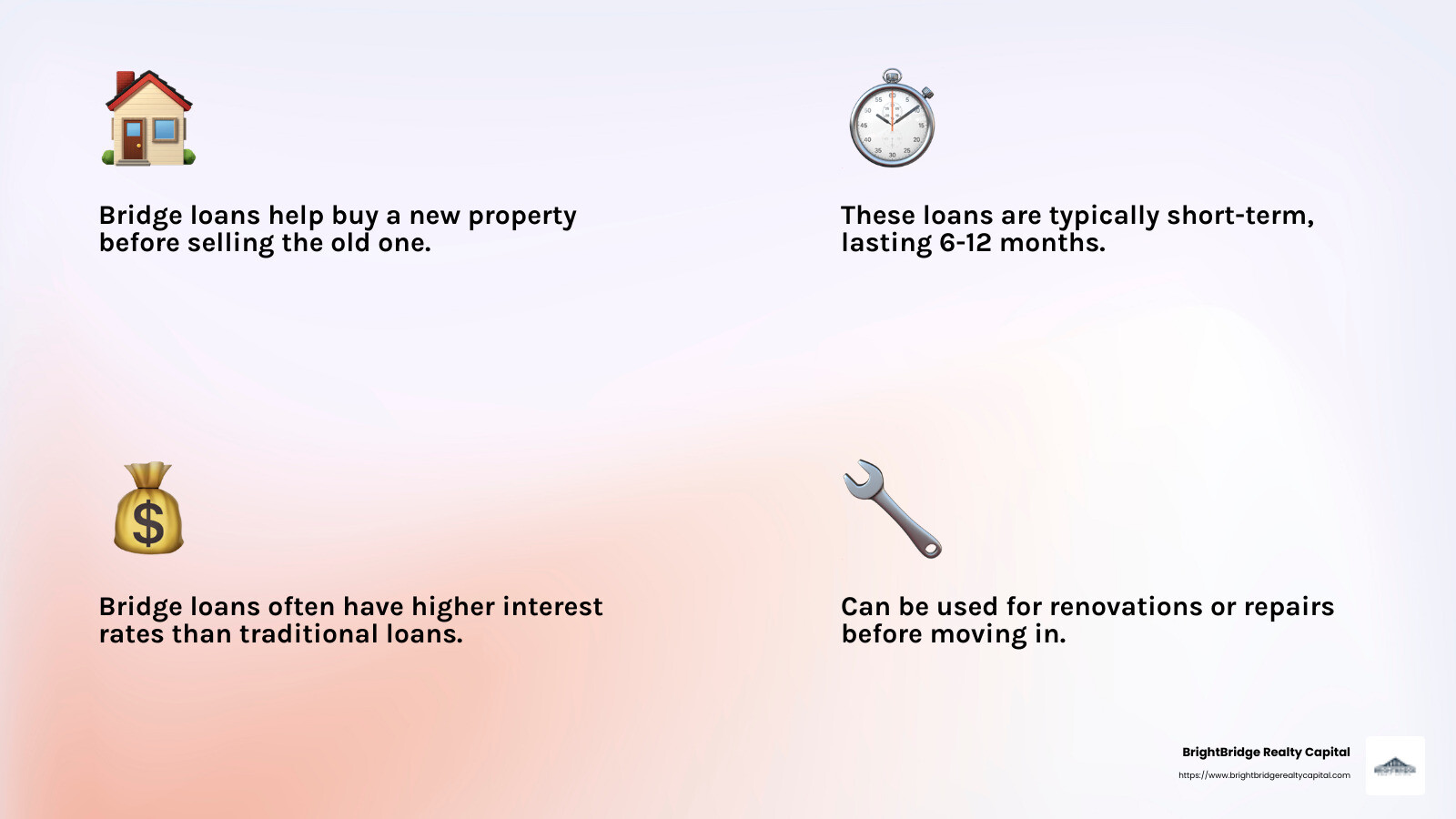Bridge Loans 101: Everything You Need to Know

Bridge loans for dummies provide a simple explanation of this short-term financing option that helps you purchase a new home before selling your old one. Here's what you need to know right away:
- Definition: A bridge loan is a temporary, high-interest loan that provides quick cash while waiting for longer-term financing.
- Purpose: It's commonly used in real estate to buy a new home while waiting for the sale of the current property.
- Cost: Bridge loans come with higher interest rates and fees than traditional loans.
- Risk: The risk lies in holding two mortgages if the current home doesn't sell quickly.
In the world of real estate investment, timing is crucial. This is where bridge loans come into play, allowing investors and homeowners to seize opportunities that require immediate funding. While they offer a rapid solution, they also carry higher costs and risks, such as maintaining multiple properties if sales don't go as planned.
We’ll explore these aspects in detail to help you decide if a bridge loan is right for your needs.

Quick bridge loans for dummies definitions:
What is a Bridge Loan?
A bridge loan is a type of temporary financing designed to "bridge" the gap between the purchase of a new property and the sale of an existing one. It's like a financial bridge that helps you cross over from one home to the next without falling into the pit of double mortgages.
How Does It Work?
Imagine this: you've found your dream house, but your current home hasn't sold yet. You need cash flow to secure the new property quickly. This is where a bridge loan comes in. It provides the funds you need to buy the new home while you wait for your old one to sell.
- Short-Term: Bridge loans are typically short-term, lasting from six months to a year. This is just enough time to sell your current home and pay off the loan.
- Higher Interest Rates: Because they're short-term and high-risk, bridge loans often have higher interest rates compared to traditional loans. This makes them more expensive, but you're paying for speed and convenience.
Real Estate Applications
In real estate, bridge loans are a valuable tool. They allow you to act fast, which is crucial in competitive markets like New York City.
- Buying Before Selling: Use a bridge loan to buy a new home before your old one sells. This prevents you from missing out on a great opportunity.
- Renovations and Repairs: Sometimes, bridge loans are used to fund renovations or repairs on a new property before you move in or sell it.

Key Points to Remember
- Quick Access: Bridge loans provide rapid access to funds, usually faster than traditional loans.
- Collateral Required: These loans are often secured by the current property, meaning your home is used as collateral.
- Risk of Dual Mortgages: If your home doesn't sell quickly, you might end up juggling two mortgages, which can strain your finances.
In summary, bridge loans offer a temporary solution for those needing quick cash in real estate transactions. They can be a lifesaver in a pinch but come with their own set of challenges and costs. Next, we'll dive into the pros and cons of using bridge loans, helping you weigh whether this option fits your financial strategy.
How Bridge Loans Work
Bridge loans can be a powerful tool for navigating the tricky waters of real estate transactions. Let's break down the key components that make them tick: equity, loan term, and secured loans.
Equity: The Foundation of Bridge Loans
Equity is the amount of your home that you truly own. It's the difference between your home's market value and what you owe on your mortgage. When you apply for a bridge loan, lenders look at your home's equity to determine how much they can lend you.
Using Equity: If you have significant equity in your current home, you can use it as leverage to secure a bridge loan. This helps you get the funds needed to purchase your new property.
Loan-to-Value Ratio (LTV): Lenders often require that the combined value of your existing mortgage and the bridge loan does not exceed 80% of your home's market value. This reduces their risk and helps you secure a better interest rate.
Loan Term: Short and Sweet
Bridge loans are short-term solutions. They typically last between six to twelve months, just long enough for you to sell your existing home and pay off the loan.
Quick Turnaround: These loans are designed for speed. The application and approval processes are usually faster than traditional loans, allowing you to act quickly in competitive markets.
Higher Costs: Because of their short duration and high risk, bridge loans have higher interest rates compared to other types of loans. You're paying for the convenience of fast access to funds.
Secured Loans: Collateral is Key
Bridge loans are usually secured loans, meaning they are backed by collateral. In most cases, the collateral is your current home.
Home as Collateral: By using your home as collateral, you can secure a bridge loan. However, this means that if you fail to sell your home or repay the loan, you risk foreclosure.
Risk Management: Lenders are more willing to provide bridge loans to borrowers with excellent credit and low debt-to-income ratios. This lowers their risk and increases your chances of approval.

Bridge loans are all about leveraging your home's equity to secure quick, short-term financing. They offer a temporary cash flow solution, allowing you to purchase a new home before selling your old one. However, it's crucial to understand the risks and costs involved. Next, we'll explore the pros and cons of bridge loans to help you decide if they're the right fit for your real estate strategy.
Bridge Loans for Dummies
Imagine you're in a race to buy your dream house, but you haven't sold your current home yet. This is where bridge loans come into play. They act like a financial bridge, helping you cross from owning one home to another without falling into the financing gap. Let’s dive into the basics of these short-term bridge loans.
Short-Term Bridge Loans: Bridging the Gap
Bridge loans are short-term loans typically lasting 6 to 12 months. They're designed to provide quick cash flow, helping you buy a new home before selling your old one. Think of them as a temporary solution to keep things moving smoothly in real estate transactions.
Quick Cash: You get immediate access to funds, which is crucial in a competitive real estate market.
Short Duration: These loans are meant to be repaid quickly, usually once your old home sells.
Real Estate Investment: A Strategic Move
Using a bridge loan can be a strategic move for real estate investment. It allows you to seize opportunities without waiting for your current property to sell.
Seize Opportunities: You can act fast on a new property and avoid losing it to other buyers.
Flexibility: It gives you the financial flexibility to handle real estate transactions without being tied down by timing issues.
Filling the Financing Gap
The key role of a bridge loan is to fill the gap between buying a new home and selling your old one. This gap can be a tricky spot if not managed well.
Avoid Double Payments: With bridge loans, you don't have to worry about paying for two mortgages at once for an extended period.
Financial Safety Net: They provide a safety net, ensuring you have the necessary funds to secure your new property.
In a nutshell, bridge loans for dummies offer a straightforward way to manage the tricky transition between homes. They provide short-term financing to help you cover the gap in real estate deals, making them a valuable tool for investors and homeowners alike. Up next, let's weigh the pros and cons of using bridge loans.
Pros and Cons of Bridge Loans
When considering bridge loans, it's crucial to weigh their pros and cons. These loans can be a lifesaver, but they come with their own set of challenges.
Pros: Immediate Cash Flow and Quick Funding
Immediate Cash Flow: Bridge loans provide quick access to funds. This is vital when you're in a hurry to buy a new property but haven't yet sold your existing one. Imagine spotting the perfect home and needing to act fast before someone else snatches it up. With a bridge loan, you can make that purchase without delay.
Quick Funding: One of the standout features of bridge loans is their speed. These loans can close much faster than traditional mortgages, often within a week. This rapid turnaround can give you a competitive edge in a busy real estate market.
Cons: Higher Interest Rates
Higher Interest Rates: The speed and convenience of bridge loans come at a cost. These loans typically have higher interest rates than standard mortgages. This is because they are short-term and riskier for lenders. Expect to pay more in interest, which can add up if your old home takes longer to sell than anticipated.
Potential Financial Strain: While bridge loans offer quick solutions, they can also lead to financial stress. If your old home doesn't sell promptly, you might find yourself juggling multiple payments—mortgages, property taxes, and insurance—for two homes. This can strain your finances quickly.
In summary, bridge loans offer immediate cash flow and quick funding, making them a powerful tool for those needing to act fast in the real estate market. However, the higher interest rates and potential for financial strain are significant considerations. Carefully weigh these factors to decide if a bridge loan is the right fit for your situation.
Next, let's explore how BrightBridge Realty Capital offers customized bridge loan solutions to meet your unique needs.
Customized Bridge Loan Solutions
When it comes to bridge loans, one size does not fit all. At BrightBridge Realty Capital, we understand that each real estate investment is unique. That's why we offer customized bridge loan solutions designed to fit your specific needs.
Custom Financing
Our approach to financing is all about flexibility. Whether you're flipping properties, building new homes, or expanding your rental portfolio, we tailor our loans to align with your investment goals. This means you can choose terms that suit your timeline and financial situation. We believe that your financing should work for you, not the other way around.
Flexible Terms
At BrightBridge Realty Capital, we offer flexible terms to ensure you get the most out of your bridge loan. Our loans can adjust to the changing dynamics of the real estate market, allowing you to steer fluctuations with ease. Need a longer loan term? We can accommodate that. Looking for a lower interest rate? We'll work with you to find the best possible solution.
BrightBridge Realty Capital Offerings
What sets us apart? Our nationwide lending and fast closing process. We cut out the middleman, giving you direct access to competitive rates and swift funding. This means you can secure your dream property without the usual delays. Plus, our team of real estate experts is dedicated to guiding you through every step, ensuring a smooth and seamless experience.
With BrightBridge Realty Capital, you get more than just a loan. You get a partner committed to helping you succeed in your real estate endeavors. Our customized bridge loan solutions are designed to provide the support you need, when you need it.
Up next, let's dig into some of the most frequently asked questions about bridge loans.
Frequently Asked Questions about Bridge Loans
What are the requirements for a bridge loan?
To qualify for a bridge loan, you need to meet specific criteria. Lenders typically look for:
- Equity: You should have significant equity in your current property. This equity acts as collateral for the loan.
- Creditworthiness: A strong credit score is crucial. Lenders prefer borrowers with a good credit history and low debt-to-income ratios.
- Financial Stability: Proof of stable income and the ability to manage additional debt is essential.
These requirements help ensure that you can handle the financial responsibilities of owning two properties during the transition.
How do bridge loan rates compare to other loans?
Bridge loans often come with higher interest rates compared to traditional loans. This is because they are short-term and carry more risk for lenders. Here's a simple comparison:
- Bridge Loans: Higher interest rates due to short-term nature and risk.
- Traditional Mortgages: Lower interest rates, as they are long-term and secured against property.
Despite the higher rates, bridge loans offer quick access to funds, which can be crucial in competitive real estate markets.
What are the closing costs associated with bridge loans?
When securing a bridge loan, be prepared for various closing costs. These may include:
- Loan Origination Fees: Charged by the lender for processing the loan application.
- Appraisal Fees: To assess the current market value of your property.
- Title Fees: Cover the cost of title searches and insurance.
- Legal Fees: For any legal work involved in the transaction.
These fees can add up, so budget for them when considering a bridge loan. At BrightBridge Realty Capital, we strive to keep these costs transparent and competitive, helping you make informed decisions.
Conclusion
Navigating bridge loans can be tricky, but with the right partner, it becomes a smoother journey. At BrightBridge Realty Capital, we specialize in providing customized financing solutions custom to your unique needs. Our focus is on delivering fast, flexible funding options to help you seize real estate opportunities when they arise.
One of our standout features is the speed of our service. We understand that in the competitive real estate market, timing is everything. That's why we offer fast closings, often within a week. This quick turnaround can be the difference between securing your dream property and missing out.
Our direct lending approach eliminates intermediaries, ensuring you get competitive rates and a seamless process. By cutting out the middleman, we streamline your experience, making it as hassle-free as possible.
Whether you're a seasoned investor or just starting out, our team is dedicated to guiding you through every step of the bridge loan process. From initial application to final payoff, we're here to ensure a smooth and successful transaction.
For more information on how we can assist with your real estate financing needs, explore our customized bridge loan solutions. Let us help you bridge the gap to your next investment opportunity.


